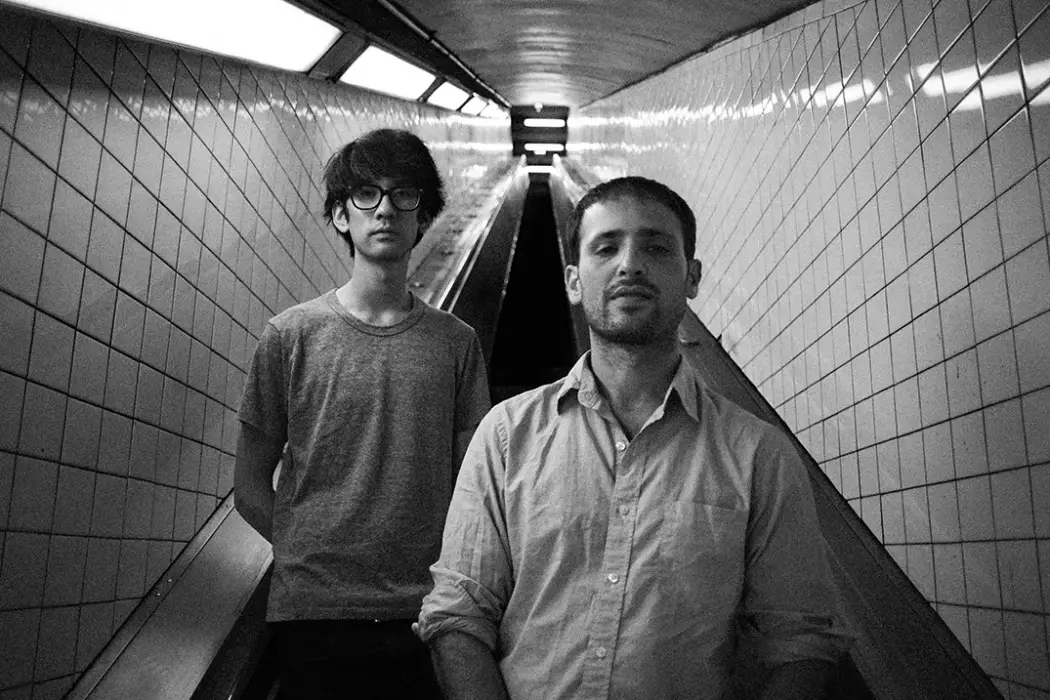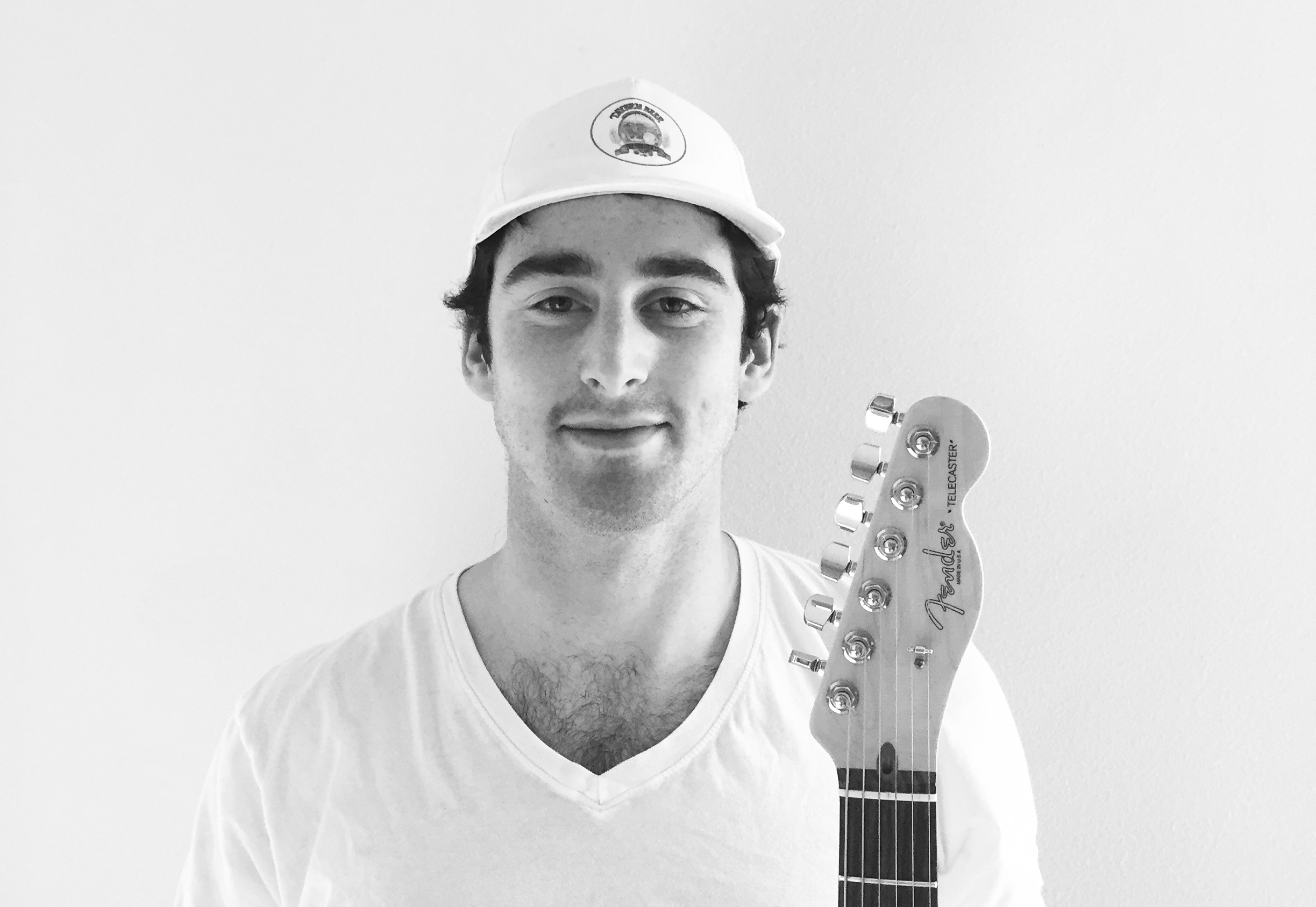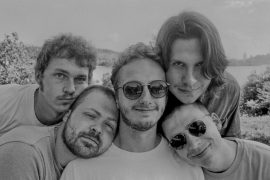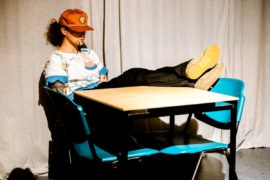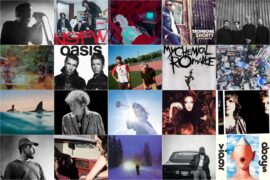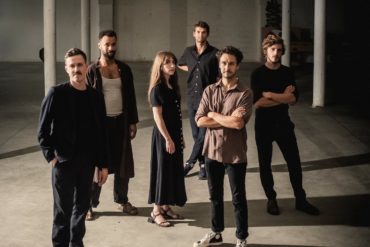Aaron Mendelsohn, half of duo Drinker, discusses the band’s origins, minimalist style, and how he and collaborator Ariel Loh beat the odds and make music from opposite coasts.
— —

Drinker is the musical project of Aaron Mendelsohn and Ariel Loh, who work against the odds with a whole country between them to craft mellow, heartfelt, and minimalist songs. With Mendelsohn. based in LA and Loh based in New York City, the music combines sunny specks with grittier elements, all of which are underpinned by a unique sentimentality.
“Follow,” released on June 1st, was the first taste the duo gave us of their debut LP, due sometime this fall. The album is an evolution of their sound, the first extended project they created from opposite coasts, a move which changed their songwriting dynamics and how the songs were crafted. While “Follow” is sunnier but still melancholic, follow-up “Fragment II,” released last Friday, is its more uptempo sibling, showcasing a different side to the band’s sound.
Atwood Magazine spoke with Drinker’s Aaron Mendelsohn after the release of “Follow” to learn about how he and Ariel Loh started to work together, to uncover the minimalist and mellow identity of this project, and to find out what we can expect from Drinker’s forthcoming album!
Listen: “Fragment II” – Drinker
A CONVERSATION WITH DRINKER
Atwood Magazine: Hi Aaron, how are you?
Aaron Mendelsohn: I’m pretty good, pretty good. In my car driving to our rehearsal space right now.
You’re playing a show tonight, right? Are you excited?
Mendelsohn: Yeah. I feel like a lot of people are coming out to this one, it should be a good one.
They should, your music’s great!
Mendelsohn: Ah, thank you. Thanks for getting into it, I appreciate it.
I’m a huge fan of Yoke Lore, so when I saw you worked with his producer I was kind of already sold. But then I listened to it and I was like “Wow, this is amazing.”
Mendelsohn: Oh wow (laughs). Cool, it’s pretty different from Yoke Lore, right? More down tempo, chill, darker.
I think so too. I’m very into darker songs so I was very into your stuff. And it’s really cool to see Ariel’s versatility as a producer as well.
Mendelsohn: I agree. I was just going to say, I feel like his strengths really work in both projects but they’ve had such a different impact.
So, speaking of. How did you and Ariel start working together?
Mendelsohn: So it was the fall of 2016. The band I used to play in had broken up around that time and I was starting to write new music. I needed someone to record it with me, and Ariel and I had known each other for a couple of years through our previous bands. I would always run into him, then we caught up, and it was around the time his score of Eyes of My Mother was coming out, he was planning on going to Sundance. I met him for a drink around that time and we just chatted and had a nice connection about music and decided to try and make some music together. That’s how it started, when I was still in New York back in 2016.
How did you decide on the band name?
Mendelsohn: Well, I was tossing a lot of different ideas around and Drinker came up kind of as a joke. Then everyone I mentioned it to thought it was really good. I don’t really know why everyone liked it so much (laughs), I kind of think it was a time for me that I was drinking a little bit more than I do normally… It’s really hard to come up with a band name, my old project struggled with that, and if you find something that seems to resonate with people or seems to work, stick with it. I remember telling a few friends and they were like “Yeah dude, I think it’s really cool” so I just kept it. We were messing around with the idea of switching it because the music was coming together really well and I knew it was a project that I was going to have to represent and be serious about, but the name just remained from the early times.
I think it fits.
Mendelsohn: Yeah? Why do you think it fits?
When you think of a drinker, that’s not necessarily the best connotation, and you picture someone who’s sad or lonely, in a haze. I think that your music is mellow, which I think most drinkers are, and the lyrics are really deep and full of meaning and kind of sad. The atmosphere of the music in general is one in which I could picture someone on a Sunday afternoon drinking something at home and listening to this.
Mendelsohn: I could picture that too (laughs). I think it’s worth brining up the lyrics and the subject matter of the music. When you’re talking about the name, I feel like the… What am I trying to say? Sorry, I’m scatter-brained. I put a lot of myself into it and it’s kind of those moments that you have when you’re late at night, by yourself, working on something or thinking about something and you come to some understanding about it or your life when you’re maybe a little bit drunk, you’ve been smoking or something. You sort of feel like you’ve got it, like this is the truth, this is my understanding. And the next day things don’t really resonate the same way. But I feel like that’s when I do most of my lyric writing, it’s like these nuggets of disconnected ideas and truths. Sometimes I don’t really know what I’m saying or what I”m talking about, but I knew at some point, and it will come back to me in time (laughs).

You released your first EP Happy Accident almost a year ago. How do you think Drinker has progressed and changed from then to today?
Mendelsohn: I moved out here after we did that, so that was a big change for us. We did that EP when I was still living in New York and we were not faced with the difficulty of being on opposite coasts, we were able to knock that out from start to finish in a couple of months. Taking songs from scratch to the finish line. Whereas since I got here, it’s been a more slow and painstaking process finishing stuff. But it’s also changed our process, in that it’s made us both way more independent in terms of what we contribute. A lot of the new material which we’re starting to put out now, maybe half of it were instrumentals that Ariel wrote that I then wrote lyrics and melodies to, and the other half were songs I wrote by myself out here. And the process of taking his instrumentals and turning them to song wasn’t always as clean and simple as adding a vocal, so once I added my part to it we’d work together when we’d visit each other.
Yeah, well since you both live on opposite coasts of the country, can you tell us a little bit more about what it’s like to write songs and be a musical duo when there’s a whole country in between you?
Mendelsohn: It’s good in the way that I feel like I can see my ideas through to the finish line more so as a song idea and I can take my time with it. Taking time allows me the ability to make sure that I’m really sure about what I’m saying and happy with it before committing it to tape. That’s the good side of it. The other side of it, well.. The project started off as more of like my thing with Ariel being an engineer and co-producer on it, but after some initial sessions it’s become a lot more of a 50/50 collaboration, so it’s sometimes hard out here writing on my own not knowing what he’s going to think about it, because if he’s not feeling it, sometimes something I’ve put a lot into will end up getting shelved.
“Follow” is the first taste we’ll get from your album. How do you think that the song represents the album, and what can we expect from the record?
Mendelsohn: I think “Follow” has a lot going on with it, it covers some of the mellower aspects of what we’re doing and also some of the heavier, more hard-edged aspects. The new record is more varied than the first record, some of it is going to be more up tempo and aggressive and heavily electronic, whereas the first record was a pretty smooth, mellow experience and I think that “Follow” does both of those things. The drum part is really glitchy, but it’s got this smooth, droning outro. We decided “Follow” was a good lead track because it just seems accessible and adventurous at the same time. The new record is really split, as I sad before, between songs that started with me and songs that started as instrumentals that Ariel did in New York and sent me. I feel like the songs that are more minor key and slower are the ones I do on my own, and the more aggressive electronic stuff are things I would write on his instrumentals. “Follow” actually started as an instrumental that he sent me but then went through a whole bunch of changes. It’s just one we’re particularly stoked about.
Listen: “Follow” – Drinker
Your music is described as you “exploring minimal arrangements while pushing the music into different territories, all the while embracing the unexpected.” Why did you choose this minimalist approach to sound, and what was the most unexpected thing you’ve embraced with Drinker so far?
Mendelsohn: The minimalist approach was kind of a response to what I had done in my previous band where it was five people and a lot of the time everyone playing at the same time and it grew out of proportion, it wasn’t a streamlined sort of vision. I really wanted to start something new that was going to be more under my control, where I could think of the whole product, song, album as a vision rather than splitting it into different personalities. The idea of keeping it minimal was the idea of keeping it really streamlined and direct. What we meant by that statement in the bio was really embracing the unexpected in terms of like, we would find something in our meticulous workflow that would be a surprising moment in the music, sort of throwing it out of the element that it’s in. That’s what the term happy accident was about for us as well, these moments of beauty that come out of not really an intention but more so just moving things around in a recording session or continuing to push and push on a song that wasn’t quite there yet but finding ourselves with something we weren’t quite going for in the first place but finding it dope.
So how do you know when a song is right there?
Mendelsohn: It’s fuuny. It’s such a collaborative thing and we have such different sensibilities most of the time, so it’s when we’re both settled on it and we agree on it, we feel like it’s done I guess.
When you play live, you add three more people to the ensemble. What difference do you think that makes in the live arrangement, and what do you hope people get from a Drinker concert?
Mendelsohn: What we’ve done live is to really make it sound like the album at first. It was really hard to do that because a lot of the sounds that we get are analogue synthesisers that are really hard to reproduce, so it presented a really big challenge to me out here, finding people who could either make those sounds happen or find a way to make it happen. I was always reluctant to use backing tracks too much, so I ended up getting a sampler and sampling a lot of moments from the record, synth hits, never anything too long or which covers the whole song. I trigger samples live and that helps us really still sound like the record. But it’s been nice because spreading it out between the four of us brings a band energy and more personality to the table without really changing the music, it’s been pretty successful bringing it to the stage. The people I play with out here are just great and really enthusiastic about the project and down to push forward with it. Above all, I like for people to have a good time. The music can be quite atmospheric and melancholic. I like to take people on a journey with the vibe and the experience of the song. It’s also not a depressing experience, it’s an uplifting experience and something that brings people into the music and hopefully out of whatever they’re going through at the time, whatever’s distracting them. I like to provide an experience that’s fun and transports people to a place where they’re just in the vibe of what we’re doing.
You recently remixed “Not Over You.” What’s remixing someone else’s track like, what do you like the most about it, and can you talk us through the process of remixing this specific song.
Mendelsohn: It’s really fun because it’s like taking all of the really hard work of writing out of the picture and trying to make something sound really good, you’re already equipped with a song. We have a lot of confidence in our production aesthetic so with “Not Over You”, I don’t know if you’ve heard the original but it’s very, very different to what we ended up doing with it. We had a lot of confidence in the synths and the vibe that we always get when we work in the studio so it was really fun to piece something together that was already created. It just had all the stuff that was more fun about recording, we’re hoping to do more of those as we go for sure.
You’ve had your tracks remixed too - what’s it like being on the other end of this process?
Mendelsohn: Super awesome. We’ve been very fortunate that Ian Chang and Elliott Moss wanted to remix our tracks because they’re both really brilliant producers and just hearing someone who’s so talented take what we’ve done and put their spin on it, in the case of Elliott Moss made it way heavier on a song that’s really delicate, and that was fun, and the Ian Chang thing was amazing. He just really flipped the song around, both remixes didn’t necessarily use every verse and every lyric, they pick and chose what they wanted. The way that Ian Chang’s remix disintegrates at the end is really beautiful. I just felt really lucky that they wanted to do it and that they came out the way they did.
Listen: “Dog Years (Ian Chang Remix)” – Drinker
Listen: “Fake It (Elliott Moss Remix)” – Drinker
;
Your Instagram account and artworks are mostly black and white or use very light,muted colours. How did you decide upon this aesthetic for the band?
Mendelsohn: Ariel is more the curator of our visual aesthetics, at least in the beginning. We record in Astoria and there’s this huge public pool near the studio, and I would always go to it on breaks and started taking these photos of this empty pool. The mood of those photos always had this desolate feel of something that was ignored or gone, and it seemed like black and white was an effective way of conveying that mood in a photo. That ended up being the cover art for the EP and we ended up using images of that pool a lot, and the black and white vibe felt well-suited to the project. I feel like the mood we were getting from the images of that pool was aligned with the song and the music, and we decided that it was good to be consistent about it and stick to that aesthetic.
If you could describe a perfect setting in which to listen to your music, what would it be?
Mendelsohn: I think a night drive is really nice. Something where you don’t have to be too active and focused and you can allow the vibe to be as transportive as possible. Not necessarily when you’re driving (laughs) but something where you can fade away and just feel what it’s doing would be ideal because we’re really cultivating some serious atmosphere with these songs. I don’t want people to notice the lyrics and focus on what it’s saying, I want people to feel what the music is providing at the same time. It definitely feels like nighttime music to me, and it kind of feels like headphone music to me, but it’s not party music, it’s music for an individual catharsis.
— —

Connect with Drinker on FB, Twitter
Discover new music on Atwood Magazine
? © Lincol Lute

